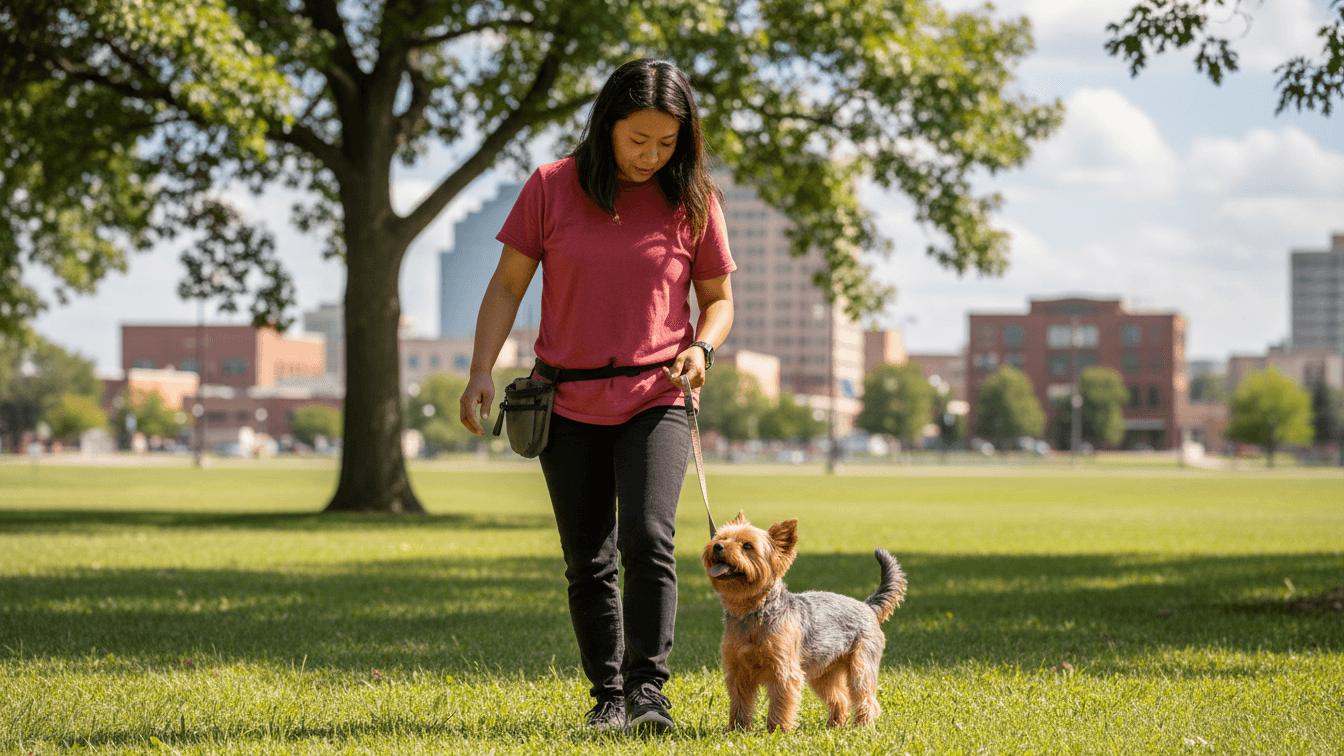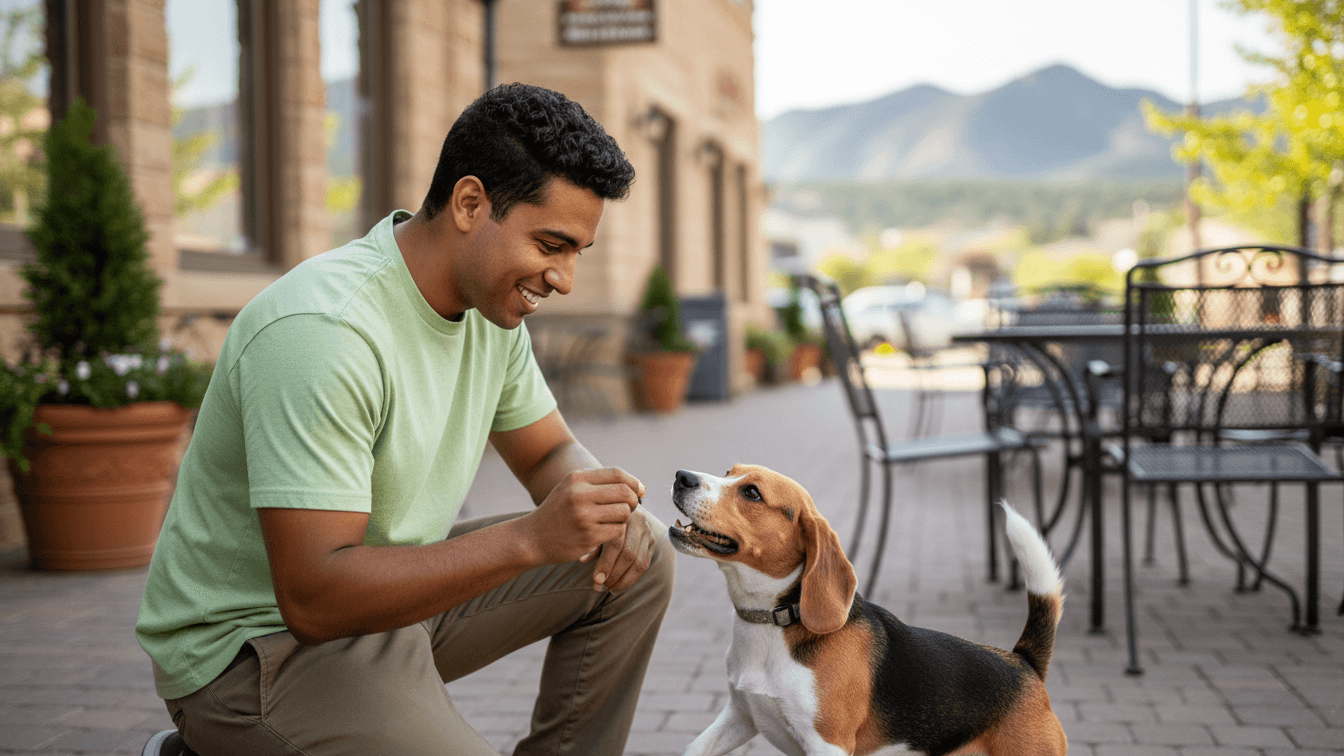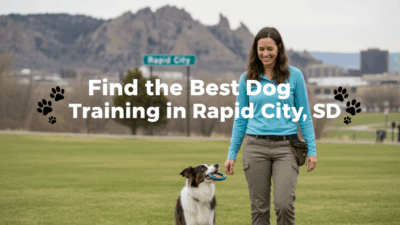Your Complete Guide to Choosing a Dog Trainer in Rapid City, SD and Surrounding Areas
Living with a dog in Rapid City means navigating a mix of urban streets, busy outdoor recreation areas, and public spaces where your dog needs solid manners. Whether you’re walking through downtown near Main Street Square, exploring Canyon Lake Park, or visiting one of the many trailheads at the edge of town, your dog should stay calm on leash, greet people politely, and handle distractions without pulling or barking.
Rapid City sits in Pennington County, and most local regulations follow city ordinances combined with county rules. Finding a professional dog trainer who understands these local details makes it easier to build skills that work in real-life situations around town.
How to Choose the Right Trainer
Start by looking for someone who uses positive reinforcement training and can create a program that matches your daily life in Rapid City. Your dog should learn to walk calmly through neighborhoods near Robbinsdale and West Boulevard, stay focused when you pass tourists headed to Mount Rushmore, and remain polite during crowded community events.
Credentials give you a clear way to compare trainers and understand their backgrounds. Common dog trainer certifications include KPA-CTP, CPDT-KA, or IAABC-CDBC for behavior problems. If your dog shows serious aggression or fear, look for someone with CBCC-KA or a science-based program like CTC.
In-home dog training works best for puppy training, door manners, house rules, and basic obedience in your actual living space. Group classes make sense once your dog can focus around other dogs, and they’re especially helpful before you try busier locations like the farmer’s market or Art Alley.
Ask whether the trainer offers a free consultation or free evaluation so you can meet them first and make sure their approach feels right for your dog.
Common Dog Training Methods Explained

Reward-based methods create the trust you want while building lasting behavior changes. They also help your dog stay calm and controlled in public spaces, which keeps you compliant with local leash laws.
Basic obedience covers sit, down, stay, place, recall, and leash training so your dog can handle walks through Memorial Park, visits to pet-friendly patios, and family gatherings without jumping on people or pulling.
Puppy classes focus on socialization, potty training, bite inhibition, crate comfort, and early leash manners. Starting young with positive training sessions prevents problem behaviors from taking root in the first place.
Behavior modification addresses fear, reactivity, resource guarding, or separation anxiety through careful desensitization and counterconditioning. For serious cases, ask if your trainer collaborates with local veterinarians to rule out medical issues.
Private lessons and dog training services let you customize everything around your schedule and your dog’s specific challenges, while day training can speed up results if you’re short on time during the week.
Dog training classes help your dog practice good manners around other dogs and people. The best group classes keep dogs at a comfortable distance, screen participants carefully, and teach calm focus rather than overexcitement.
Specialized programs like therapy dog training or service dog training require extra structure, public-access skills, and a very clear step-by-step training program.
Stay away from trainers who use fear, pain, or intimidation to get results. Humane methods are safer for everyone, easier to maintain long-term, and much better for keeping peace with neighbors and the broader community.
Average Cost of Dog Training in Rapid City, SD (Updated for 2025)
Prices around Rapid City and Pennington County depend on the trainer’s experience, session length, and whether you choose private lessons, group sessions, or board and train. Here’s what most local dog owners are paying in 2025.
| Service Type | Average Cost (Rapid City/Pennington County) |
|---|---|
| Puppy classes (4-6 weeks) | $140-$260 total |
| Group obedience classes (4-6 weeks) | $150-$280 total |
| Private lessons (60-90 min) | $100-$180 per session |
| In-home coaching packages (4-6 visits) | $400-$850 total |
| Day training (trainer works your dog + handoff) | $400-$900 per week |
| Behavior consult for reactivity/anxiety (initial) | $140-$240 |
| Board and train (2-4 weeks) | $1,800-$4,200 total |
You may pay extra travel fees if you live farther out in Pennington County, and expect higher rates for complex behavior work like aggression or severe anxiety.
Make sure you understand what’s included in the quoted price, how the trainer tracks progress, and whether they offer follow-up support after your training program ends.
Questions to Ask a Potential Dog Trainer
- What training methods do you use, and how do you keep training sessions positive and low-stress?
- What credentials do you have, like CPDT-KSA or KPA-CTP? Do you keep up with continuing education?
- How will you customize the training plan for my dog’s specific needs and our lifestyle in Rapid City?
- Do you offer in-home visits, dog obedience training classes, or day training, and which approach fits my goals best?
- How will we measure my dog’s progress and know when to add more distractions?
- What are the total costs, including any travel fees, and what’s your cancellation policy?
- Do you carry liability insurance, and can you show me proof?
- For behavior problems, will you work with my veterinarian if needed?
- What should I practice between our sessions to help my dog keep improving?
Local Rapid City Rules and Considerations
Rapid City enforces leash laws and nuisance rules to keep parks, trails, and neighborhoods safe for everyone. Pennington County follows South Dakota’s public health requirements too.
Leashes are required in all public spaces except inside designated dog parks. Keep a standard 6-foot leash with you for city sidewalks, parks, and community events.
South Dakota law requires current rabies vaccination for all dogs. You can get these through county clinics or your regular vet, and you should keep vaccination records handy.
Excessive barking can be considered a nuisance under city ordinances, so work with your trainer on alert barking and separation anxiety before neighbors file complaints. If your trainer wants to use city parks for commercial training sessions, they may need permits and proof of insurance.
South Dakota doesn’t require special licenses for expert dog trainers, but if a business boards dogs for payment, the state’s Animal Industry Board oversees kennel licensing and inspections.
The City of Rapid City Animal Control handles lost pets, bite reports, and other city-specific animal services.
Local Rapid City Resources for Dog Owners
These spots give you great places to practice polite manners, work on recalls, and provide safe enrichment for your dog while you’re training for dogs around town. Always follow posted rules and etiquette guidelines.
- Memorial Park Dog Park on Sheridan Lake Road offers fenced areas with separate sections for large and small dogs. Practice recalls and calm greetings during quieter times of day.
- Canyon Lake Dog Park near downtown provides a fenced space close to Canyon Lake Park, making it convenient for training sessions followed by leashed walks around the lake.
- Hanson-Larsen Memorial Park Dog Park on the west side of town gives you another fenced option for off-leash practice in a controlled environment.
- Rapid City Parks and Recreation Department offers information on all city parks and their specific rules regarding dogs.
- Black Hills Animal Hospital and other local veterinary clinics can provide referrals to certified dog trainers and help with behavior problems that may have medical causes.

FAQs
How much does in-home dog training cost?
Most Rapid City trainers charge $100-$180 per in-home visit, with discounts available when you buy packages. Behavior modification for issues like reactivity or aggression typically starts at the higher end of that range.
Is in-home dog training worth it?
Absolutely, because you’re working on problems exactly where they happen. Your trainer can fix door manners, jumping on guests, counter-surfing, and yard reactivity right at home, then step outside to practice leash skills on your actual neighborhood sidewalks around areas like Robbinsdale or West Boulevard.
Can you pay someone to house train your dog?
Yes, many trainers offer puppy programs that include potty training, crate routines, and daily schedules. Day training can speed up the process while teaching you how to maintain the progress after the trainer leaves.
What is the 3-3-3 rule for dog training?
This is a helpful timeline for new or adopted dogs: expect about 3 days for your dog to decompress, 3 weeks to learn your routines, and 3 months to feel completely settled. Good training plans work with this natural adjustment period rather than rushing things.
How long will it take to reach my training goals?
Most puppies and friendly adult dogs show solid progress within 4-8 weeks if you practice daily. Fear, reactivity, or aggressive dog training typically requires several months of careful behavior modification with gradual increases in difficulty and distractions.
What should I bring to group classes?
Pack a flat collar or harness, a 6-foot leash, high-value treats, water, and current vaccination records if your trainer requests them. Leave retractable leashes at home for safety reasons.
What’s the leash law in Rapid City?
Dogs must be leashed and under control in all public areas, except inside designated off-leash dog parks. Keep that 6-foot leash handy for city sidewalks, downtown areas, parks, and community events.
Do I need a dog license in Rapid City or Pennington County?
Rapid City requires dog licenses for all dogs over four months old. You can get a license through the City of Rapid City Finance Office, and you’ll need proof of current rabies vaccination. Licenses must be renewed annually.
What shots does my dog need in Pennington County or South Dakota?
Rabies vaccination is required throughout South Dakota for all dogs. Your veterinarian may also recommend distemper-parvo, bordetella, and other vaccines based on your dog’s lifestyle and exposure to other dogs.
Are dog trainers required to be licensed in Rapid City or Pennington County or South Dakota?
No special trainer licenses exist in South Dakota. Trainers follow normal business regulations, but if they offer board and train services, their facility may need to be licensed as a boarding kennel under the state’s Animal Industry Board regulations.
Where can I practice off-leash recall?
Use fenced dog parks like Memorial Park Dog Park, Canyon Lake Dog Park, or Hanson-Larsen Memorial Park Dog Park to keep things safe and legal. Try visiting during quieter hours when you’re starting out so your dog can focus better.
Which dog parks allow training around Rapid City?
Memorial Park Dog Park, Canyon Lake Dog Park, and Hanson-Larsen Memorial Park Dog Park all allow off-leash play and training practice within their fenced areas. These are the best options for working on recalls and socialization in a controlled environment.
What trails allow dogs for training?
Leashed dogs are welcome on most trails in the Black Hills National Forest surrounding Rapid City, including popular spots like M Hill Trail, Skyline Wilderness Area trails, and Dinosaur Park trails. These locations are perfect for teaching calm focus around hikers, mountain bikers, and wildlife while building your dog’s confidence on varied terrain.
How do I find a well-behaved dog trainer in Rapid City?
Look for someone with verifiable dog trainer certifications who uses positive reinforcement methods and can provide references or testimonials from local clients. A certified dog trainer should be able to explain their methods clearly and show you how they’ll help your dog learn without fear or intimidation.
What if my dog has separation anxiety?
Separation anxiety requires careful behavior modification through gradual desensitization and counterconditioning. Work with a qualified trainer who has experience with anxiety-related behaviors, and consider consulting with your veterinarian to rule out medical causes and discuss whether medication might help during the training process.
The right combination of thoughtful planning, humane methods, and consistent practice around Rapid City’s parks and neighborhoods will help your dog become a confident, well-behaved dog. Whether you choose private lessons, group classes, or board and train, make sure your trainer understands the local environment and can help your dog succeed in real-world situations around town.
